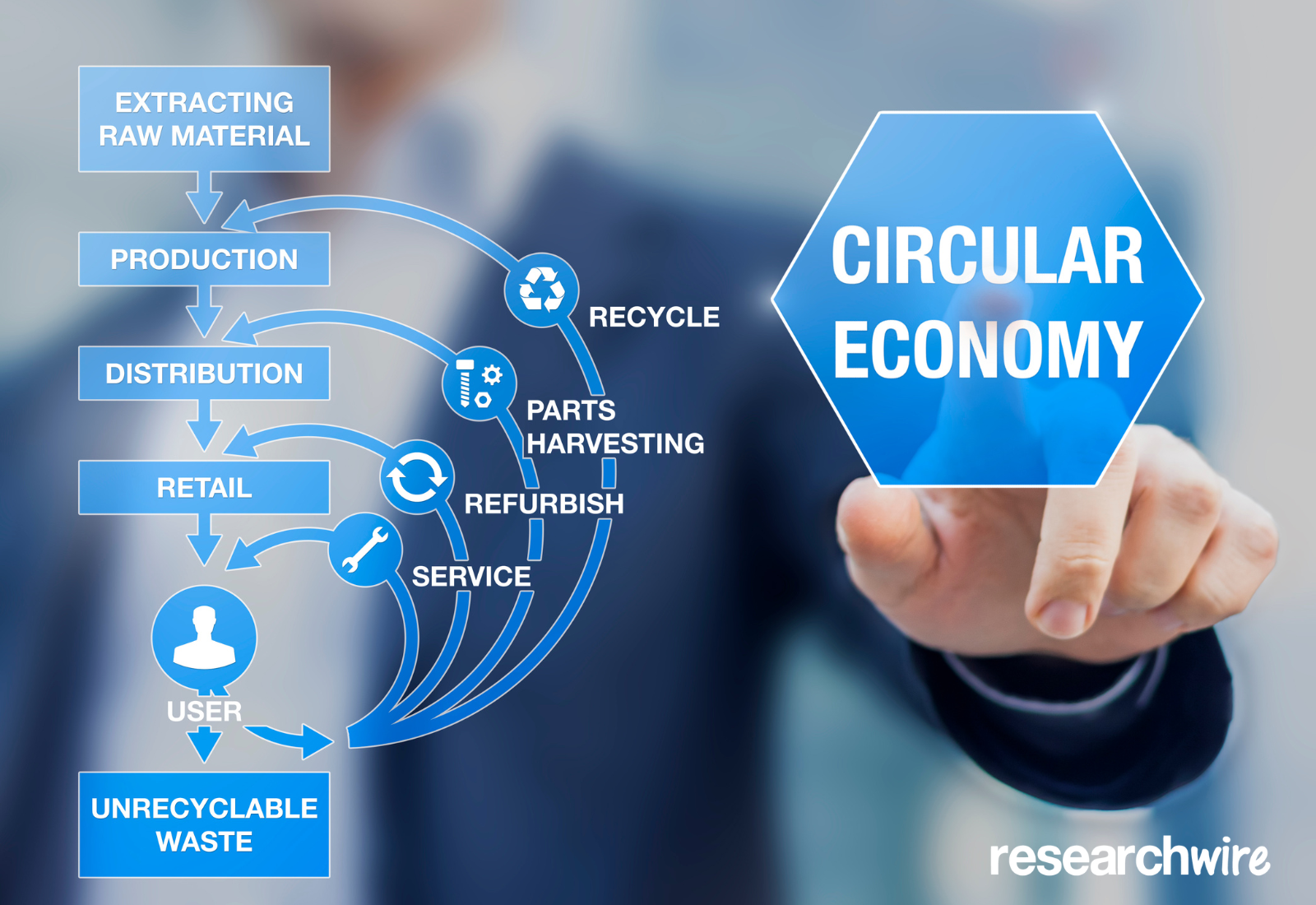Rohit Kumar is responsible for Researchwire European & North American business. He is an HEC, Paris 2008 MBA and Indian Institute of Technology (IIT) Kharagpur 2002 engineering graduate with close to 17 years of experience in business innovation and strategy, business development and client relationship roles. He is working with ResearchWire since 2016 and as a partner, is responsible for the growth of ResearchWire in Europe and North America.
Prior to ResearchWire, Rohit was handling sales strategy and pricing for Syniverse Technologies, a telecom services provider, where he was instrumental for growth in EMEA and India through product innovations, creative pricing and discounting models and executing strategic sales plans.
Rohit is based out of Luxembourg and has been living in Europe for last 12 years. He understands European & North American customers and their needs and ensures that our customers always have a local person to reach out whenever needed.
Circular economy principles revolve around the concept of minimizing waste and maximizing the value of resources by keeping products, materials, and resources in use for as long as possible. It involves a holistic approach to design, production, consumption, and disposal, aiming to decouple economic growth from the depletion of finite resources.
 At its core, circular economy principles encompass various strategies:
At its core, circular economy principles encompass various strategies:
-
Designing for Durability and Reusability:
Products are designed with longevity in mind, ensuring durability and ease of repair. Moreover, emphasis is placed on designing products for multiple lifecycles or enabling components to be reused or repurposed.
-
Resource Efficiency and Recycling:
Maximizing the utilization of resources through efficient production processes and promoting recycling initiatives to recover materials for future use.
-
Shift from Ownership to Service Models:
Encouraging service-based business models, such as product-as-a-service or sharing platforms, which promote access to goods rather than ownership, thereby reducing overall resource consumption.
-
Digitalization and Technological Innovation:
Harnessing digital technologies like IoT (Internet of Things), AI (Artificial Intelligence), and blockchain to optimize resource use, track materials, and facilitate closed-loop systems.
The fusion of digitalization and circular economy principles has unlocked innovative opportunities, enabling businesses to streamline operations, enhance resource efficiency, and create more sustainable products and services.
This blog aims to explore the intersection of digitalization and circular economy principles, exploring how these intertwined concepts shape modern business strategies, and the impact of patents and intellectual property in fostering sustainability and innovation.
Role of Digitalization in Advancing Circular Economy
Integration of Technology in Circular Economy Models
The convergence of digitalization with circular economy models has sparked a revolution in how businesses operate, innovate, and drive sustainability initiatives. Incorporating technology across the value chain has amplified the effectiveness of circular economy principles.
-
Tracking and Traceability:
Digital technologies facilitate the seamless tracking and traceability of products and materials throughout their lifecycle. RFID tags, QR codes, and blockchain enable real-time monitoring, ensuring transparency and accountability in supply chains, which is pivotal for efficient resource management.
-
Predictive Maintenance and Extending Product Lifespan:
IoT-driven sensors embedded within products enable predictive maintenance, allowing businesses to foresee potential issues and proactively address them. This practice significantly extends the lifespan of products, reducing unnecessary waste and promoting a more sustainable consumption pattern.
IoT, AI, and Big Data in Promoting Sustainability
-
IoT’s Role in Resource Optimization:
The Internet of Things (IoT) plays a pivotal role in optimizing resource utilization by providing real-time data on energy consumption, material usage, and process efficiency. This data empowers businesses to make informed decisions aimed at reducing waste and enhancing productivity.
-
AI’s Contribution to Circular Economy:
Artificial Intelligence (AI) algorithms analyse vast sets of data to identify patterns and optimize processes. In the context of circular economy principles, AI assists in material recovery, waste sorting, and resource allocation, thereby minimizing environmental impact and maximizing resource efficiency.
-
Leveraging Big Data for Sustainability:
Big Data analytics offer invaluable insights into consumer behaviour, market trends, and material flows. This information enables businesses to design products that align with consumer preferences while ensuring they are more easily recyclable or reusable, thus contributing to a more circular economy.
The integration of IoT, AI, and Big Data in promoting sustainability within circular economy models represents a paradigm shift, empowering businesses to optimize resource use, reduce waste, and innovate towards a more sustainable future.
Patents and IP in the Context of Circular Economy and Digitalization
Protection of Innovations in Sustainable Technologies
The development of sustainable technologies crucial for advancing circular economy principles often necessitates substantial investments in research and development. Patent protection plays a pivotal role in safeguarding these innovations, providing incentives for companies to invest in sustainable solutions.
-
Encouraging Innovation through Patents:
Patents incentivize companies and individuals to invest in research and development by granting them exclusive rights to their inventions. This exclusivity allows innovators to recoup investments and incentivizes further advancements in sustainable technologies.
-
Promoting Commercialization of Green Innovations:
IP protection, including patents, fosters the commercialization of sustainable technologies. It provides a competitive advantage by enabling innovators to capitalize on their inventions through licensing agreements or commercial partnerships.
Balancing Patent Rights and Open Innovation for Sustainability
-
Open Innovation and Collaborative Ecosystems:
While patents offer exclusivity, fostering open innovation and collaborative ecosystems is vital for accelerating sustainable advancements. Collaborations and open-source initiatives encouraging the sharing of knowledge and resources, leading to collective progress in addressing environmental challenges.
-
Licensing and Technology Transfer for Sustainability:
Utilizing patent licensing and technology transfer mechanisms can facilitate the dissemination of sustainable technologies. Strategic licensing agreements enable broader access to innovations, fostering their widespread adoption and implementation.
Real-Life Case Studies
This blog provides an extensive overview of the intersection between circular economy principles, digitalization, and intellectual property rights, emphasizing the role of technology in fostering sustainability and innovation. Here are real-world examples that exemplify these concepts:
-
IBM Food Trust – Tracking and Traceability:
IBM Food Trust* is a blockchain-based platform used in the food industry. It enables retailers, suppliers, and consumers to trace the journey of food products from farm to table, ensuring transparency and reducing food waste by allowing early detection and management of spoilage or contamination issues.
-
VeChain and DNV – Circular Supply Chains and Blockchain:
VeChain collaborates with DNV to develop blockchain solutions for supply chain transparency and circular economy initiatives. This promotes the tracking of products, ensuring ethical sourcing and a circular flow of materials.
-
The Ellen MacArthur Foundation – Open Innovation Initiatives:
The foundation fosters open-source collaborations, bringing together businesses, governments, and academia for circular economy initiatives. This collective effort encourages sustainability.
-
TerraCycle – Collaborative Recycling Platforms:
TerraCycle’s patented platforms facilitate recycling of hard-to-recycle materials, promoting a collaborative approach for individuals and businesses to participate in recycling programs.
Challenges and Opportunities in Patenting Green Technologies
-
Technological Complexity and Patentability:
Green technologies often involve intricate systems and interdisciplinary approaches, posing challenges in defining patentable subject matter. Determining patent eligibility and ensuring the novelty and non-obviousness of sustainable innovations can be complex.
-
Accessibility vs. Exclusivity Dilemma:
Balancing the need for widespread access to green technologies while maintaining incentives for innovation poses a significant challenge. Finding a middle ground that promotes accessibility without discouraging R&D investment is crucial.
Addressing Challenges and Ethical Considerations
Intellectual Property Rights vs. Access to Sustainable Technologies
-
Accessibility:
Intellectual property rights can impede access to sustainable technologies in developing regions due to high licensing fees and exclusive rights, posing challenges to the widespread adoption of eco-friendly innovations and raising concerns about equitable access.
-
Balancing IP Protection and Access:
Mechanisms such as compulsory licensing or patent pools can facilitate access without entirely compromising innovators’ rights.
Legal and Ethical Considerations
- IP and Global Inequality:
The unequal distribution of Intellectual Property (IP) rights may widen global disparities, especially in integrating circular economy practices in developing nations, hindering the adoption of crucial sustainable innovations and impeding progress toward global sustainability goals.
-
Ethical Dilemmas:
Ethical questions arise when exclusive rights are claimed for environmentally crucial technologies, as the debate centres on balancing profit-driven IP protection with broader accessibility, requiring a delicate balance between incentivizing innovation and considering the societal and environmental impacts of technological advancements.
Future Trends and Conclusion
As digitalization continues to evolve, its integration with circular economy principles is expected to grow. Emerging trends forecast a deeper reliance on technologies like AI, machine learning, and IoT for optimizing resource use, enhancing supply chain transparency, and promoting circularity in product design and lifecycle management.
The landscape of patents is dynamically shifting towards sustainability-driven innovation. There’s a notable surge in patents focusing on eco-friendly materials, waste management technologies, renewable energy solutions, and circular supply chain innovations. The convergence of digital tools and circular strategies will likely lead to more innovative solutions for sustainable practices across various industries. Through ResearchWire ‘s guidance, companies can confidently protect their sustainable inventions, fostering a more resilient and environmentally conscious marketplace.
By providing strategic insights, tailored research, and legal counsel, Researchwire empowers businesses to navigate the intricate process of patenting eco-conscious creations. If you are a stakeholder in the circular economy and are looking to get insights into trends in specific technology areas to better position yourself in making proper business decisions, or are developing, or planning to develop, a strong patent portfolio around specific technologies and its use cases, reach out to Researchwire.
ResearchWire provides collaborative opportunities for clients seeking to reduce their product’s carbon footprint, initiating personalized consultations and exploring key details such as targeted products, existing assessments, energy consumption data, and the significance of sustainability to the target market.
If you are a stakeholder in the innovation ecosystem and are looking to get insights into trends in specific technology areas to better position yourself in making proper business decisions, or are developing, or planning to develop, a strong patent portfolio around specific technologies and its use cases, reach out to Researchwire.
About Us
We are an ISO 27001 certified, specialised IP research and R&D support company. Works closely with IP & legal teams to provide patent portfolio services and all types of patent searches & patent drafting. It provides enterprises and R&D centres with insightful and effective solutions to address their technology development challenges and roadmap planning.



